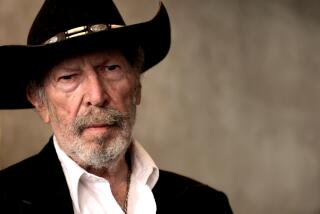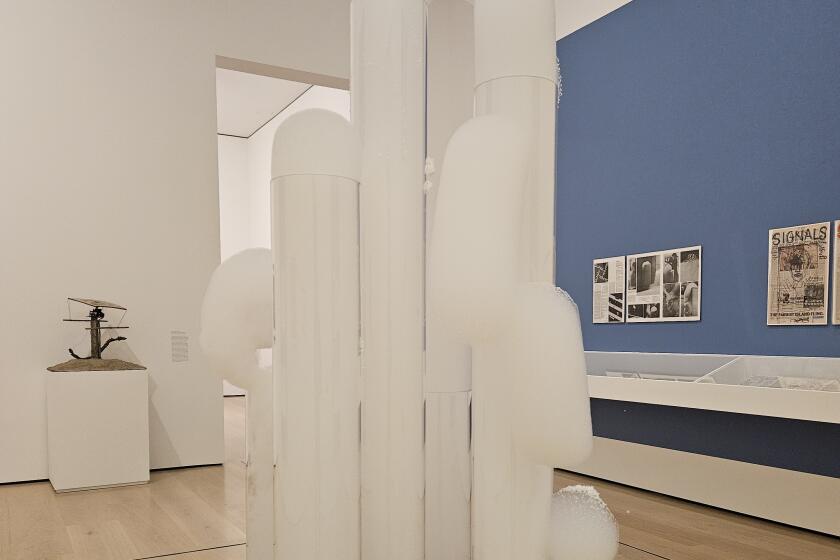TASTE MAKERS : People Who Shape and Define Matters of Taste : PHILIP GLASS : FROM THE ROCK HALLS TO OPERA
He lives in New York’s East Village between Hell’s Angels’ headquarters and a shelter for homeless men, wears jeans that puddle around his ankles and never pays over $4 for a haircut--an event which, like a solstice, occurs twice a year, once in summer and once in winter.
Nevertheless, the music of minimalist composer Philip Glass is fast becoming mainstream chic. His repetitive harmonies are heard from rock concert halls to the New York City Opera and are both adored and abhorred.
But notoriety has left Glass, 48, little changed. He takes tribal pride in the Lower East Side avant-garde, touting the neighborhood’s prominent names, its burgeoning art galleries and ethnic restaurants. He dismisses SoHo as “a shopping mall.”
He is more ambivalent, however, about the rigors of having a public persona. His favorite contemporary trend is the one of which he is part--the interdisciplinary collaboration of artists. But, though he aims to restore the bond between composer and auditor, his biggest headache is meeting his public “eyeball to eyeball”--performing with his ensemble and greeting fans. “As social creatures, I don’t think we were meant to know that many people,” he says.
Meanwhile, his personal life has become more private. Only “the barest handful” of friends--none of them stars--regularly drops by his house and he doesn’t tack up concert posters or record albums on the walls. Parts of all of his operas have been written in his summer house in Nova Scotia, “10 miles away from anything.” And when he’s on a serious solitude binge, Glass won’t open his mail and erases messages on his answering machine.
Yet his collaborative work thrives on human contact and ideas come largely through people--from sitarist Ravi Shankar, whose Indian music inspired his rhythm patterns, to David Byrne of the Talking Heads and Linda Ronstadt, with whom he is currently working on a record project.
People have also been the subject matter of his operas--Einstein, Gandhi (“Satyagraha”) and the monotheistic Egyptian pharaoh, Akhenaten.
Like them, Glass, a philosophy major who has traveled often to India, espouses concepts over possessions. His centerpiece thought, a product of post-World War II America, is connectedness. “A sense of social context extends to the work I do,” he says of his layered melodies. “I see my work as part of the fabric that stretches . . . over everything.”
He is drawn to the cultural life of a people, rather than to politics. He can’t name the order of recent Russian premiers and quips, “Who’s Major Deegan? It’s a highway in New York.”
Yet he says history is an important ingredient in his work, and he reads widely to prepare for his compositions. He is currently absorbed in Richard Leakey’s “People of the Lake,” and his interest in Doris Lessing lead him to write his current opera-in-progress, “The Making of the Representative for Planet 8,” based on her novel of the same name.
The library is the focal point of his house, where he lives with artist Candy Jernigan, but Glass is also a red-blooded American consumer. He has enough TV sets so that he “doesn’t have to go upstairs” (although he says he only watches the news).
He was brought up in Baltimore with a healthy respect for family, neighborhood and marriage--a social institution he’s tripped over twice. In his relationship with women, marriage has been a minor event. He worked with his first wife, theater director Jo Anne Akalaitis, for 20 years and shared with her the raising of their 17-year-old daughter and 14-year-old son. But their domestic ties snapped after about four years. His second liaison, with a physician, was even shorter.
Glass shares the cooking with Jernigan and, when the children are with them, the family gathers for a leisurely dinner. “I like the family time,” he says. He calls Jernigan his “girlfriend,” and says she and his daughter buy what few garments he owns. (The wardrobe of a true minimalist consists of jeans, sneakers and one suit for weddings, funerals and opera premieres.)
Along with haberdashery, croissant eateries and country music are also low on his personal pop chart. Serious contempt is reserved, however, for what he considers the dismantling of civil liberties. “We’re in a very dark period,” he says.
He limits technology to his sound studio. At home, high-tech means an electric pencil sharpener, a birthday gift a year ago. Musical equipment for the living room consists of an $800 stereo and a $400 pair of Yamaha speakers bought on sale at Crazy Eddie’s, the New York electronics chain. “I want to know what my records sound like in an ordinary situation,” he says.
He attributes his cross-over performances to mental versatility, saying, “I find everything kind of interesting.” He doesn’t like the word eclectic (“It sounds superficial”). Nevertheless, the Glass menagerie of associates has ranged from theater director Robert Wilson (“the CIVIL WarS”) to Moondog, Manhattan’s folkloric street bard, who Glass took into his home for a year and regularly played music with.
As recently as the late ‘70s Glass drove a New York cab, and he has earned money moving furniture and repairing kitchen sinks.
Besides music, his ties are to art. “The visual world is the thing I always go back to,” he says. He is currently interested in David Hockney’s photography and raves about Richard Serra’s controversial public sculpture in St. Louis. (He once was Serra’s studio assistant.)
On a recent trip to Vienna, he discovered the depths of Rembrandt’s self-portraits at the Kunsthistorisches Museum. “I had the impression of being intensely quiet,” he says. “There were no words in my mind. That’s what art does to me.”
More to Read
The biggest entertainment stories
Get our big stories about Hollywood, film, television, music, arts, culture and more right in your inbox as soon as they publish.
You may occasionally receive promotional content from the Los Angeles Times.






